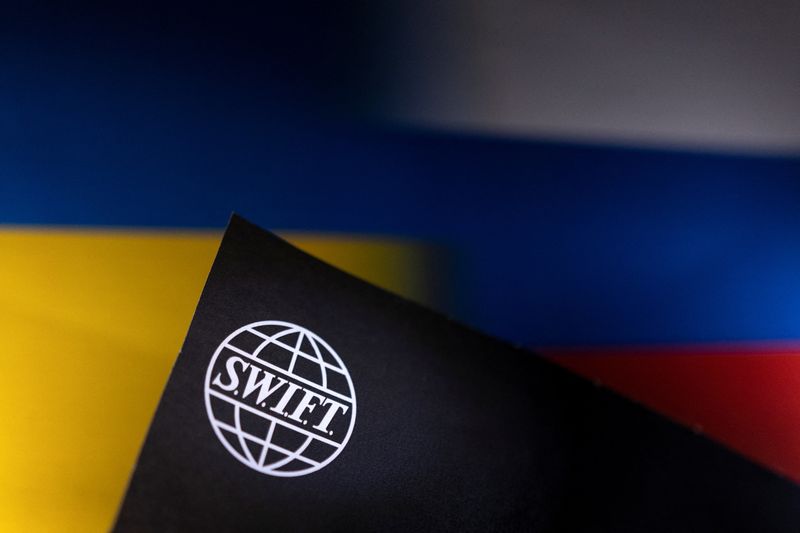By Tom Bergin
LONDON (Reuters) - The European Union, along with the United States and other Western partners, has announced further sanctions on Russia for its invasion of Ukraine, including cutting off a number of Russian banks from the SWIFT interbank payments system.
SWIFT is the world's main international payments network. Here is more about what it does and why it matters:
WHAT IS SWIFT?
SWIFT, or the "Society for Worldwide Interbank Financial Telecommunication", is a secure messaging system that facilitates rapid cross-border payments, making international trade flow smoothly.
Banks which connect to the SWIFT system and establish relationships with other banks can use SWIFT messages to make payments.
The messages are secure so that payment instructions are typically honoured without question. This allows banks to process high volumes of transactions at speed.
It has become the principal mechanism for financing international trade. In 2020, around 38 million SWIFT 'FIN messages' were sent each day over the SWIFT platform, according to its 2020 Annual Review. Each year, trillions of dollars are transferred using the system.
WHO OWNS SWIFT?
SWIFT, founded in the 1970s, is a co-operative of thousands of member institutions which use the service.
Based in Belgium, SWIFT made a profit of €36 million in 2020, according to its 2020 Annual Review. It is run principally as a service to its members.
WHY IS A SWIFT BAN SO SERIOUS?
Excluding Russian banks from SWIFT restricts the country’s access to financial markets across the world.
Russian companies and individuals will find it harder to pay for imports and receive cash for exports, borrow or invest overseas.
Russian banks could use other channels for payments such as phones, messaging apps or email. That would let Russian banks make payments via banks in countries which have not imposed sanctions but since alternatives are likely to be less efficient and secure, transaction volumes could fall and costs rise.
HOW WOULD SWIFT BAN ON RUSSIA AFFECT OTHER COUNTRIES?
Exporters would find selling goods to Russia riskier and more expensive.
Russia is a big buyer of manufactured goods. The Netherlands and Germany are its second and third biggest trading partners, based on World Bank data, although Russia is not a top 10 export market for either country.
Foreign buyers of Russian goods would also find it more difficult, potentially prompting them to seek alternative suppliers.
But when it comes to Russian oil and gas, foreign buyers could find it harder to find replacement suppliers.
Russia is the main EU supplier of crude oil, natural gas and solid fossil fuels, according to the European Commission https://ec.europa.eu/eurostat/cache/infographs/energy/bloc-2c.html.
IS SWIFT BOUND BY ECONOMIC SANCTIONS?
SWIFT is bound by Belgian and European Union rules, which would include economic sanctions.

SWIFT's website says: "Whilst sanctions are imposed independently in different jurisdictions around the world, SWIFT cannot arbitrarily choose which jurisdiction's sanction regime to follow."
In March 2012, the European Union barred SWIFT from serving Iranian firms and individuals which had been sanctioned in relation to Tehran's nuclear programme. The list included the central bank and other big banks.